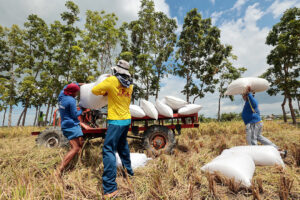




Philippines Trade Update: Imports weaken on tepid demand
 DOWNLOAD
DOWNLOAD

Policy Rate Updates: BSP outlook — cloudy with a chance of rate cut
 DOWNLOAD
DOWNLOAD

January Economic Update: Growth slows, prices rise
 DOWNLOAD
DOWNLOAD


Farm output subsidies in PH regressive, says WB

The Philippines has one of the most regressive agricultural output subsidies, the World Bank (WB) said.
In a report, the Philippines ranked first among 16 countries in terms of regressive output subsidies, followed by Mexico, Canada, Japan, and Vietnam.
Meanwhile, Brazil, Kazakhstan, and Indonesia had the most progressive subsidies.
The World Bank conducted an analysis to examine the distributional impact of agricultural subsidies in multiple countries, which then indicates the scheme’s progressiveness or regressiveness.
“As with any subsidy linked to production amounts, output subsidies will naturally be regressive, since richer farmers will always produce more output and therefore receive a larger share of the subsidy than poorer farmers,” it said.
“Nevertheless, this analysis uses a lower threshold for what is considered progressive. It examines whether poorer regions in each country receive a relatively larger share of output subsidies than their share of agricultural production value,” it added.
For example, a subsidy is considered “progressive” if the country’s poorer regions receive a larger share of producer single commodity transfer (PSCT) than their share of agricultural production. On the other hand, if poorer regions receive a smaller share, then the subsidy is regressive and acts “more like a tax than a subsidy.”
A PSCT indicator measures the annual monetary value of gross transfers from consumers and taxpayers to agricultural producers, including its market price support and output subsidies.
According to the World Bank, 80% of the world’s extremely poor and 75% of the moderately poor live in rural areas and engage in agriculture.
“In many cases, agricultural subsidy programs double as rural development, livelihood, and safety net programs. Therefore, another important indicator of the usefulness of agricultural subsidies is how progressive they are — that is, what share of the subsidy is captured by the lowest income quantiles,” it added.
The World Bank said the Philippines would benefit from shifting its output subsidies from rice to maize.
Data from the report show that rice receives the most subsidies among all commodities across countries, followed by maize, wheat, sugar, and soybeans.
“The analysis also finds that if countries were to shift their output subsidies on rice, a very water-intensive crop responsible for exacerbating harmful externalities like water scarcity, salinization, and carbon dioxide emissions, to maize, then their subsidies would become significantly more spatially progressive,” it added.
The World Bank said that output subsidies should re-evaluate what crops receive which subsidies and prioritize those that poorer households produce, such as maize.
“In many countries, this approach implies a shift away from subsidizing rice, which would entail other environmental co-benefits like reducing agriculture’s water and carbon footprints,” it said.
“Although the distributions of PSCT transfers on crops across countries vary considerably, the distribution of production tends to be more progressive for maize than for other crops — that is, maize tends to be produced in poorer areas of the country,” it added. — Luisa Maria Jacinta C. Jocson
This article originally appeared on bworldonline.com





 By BusinessWorld
By BusinessWorld